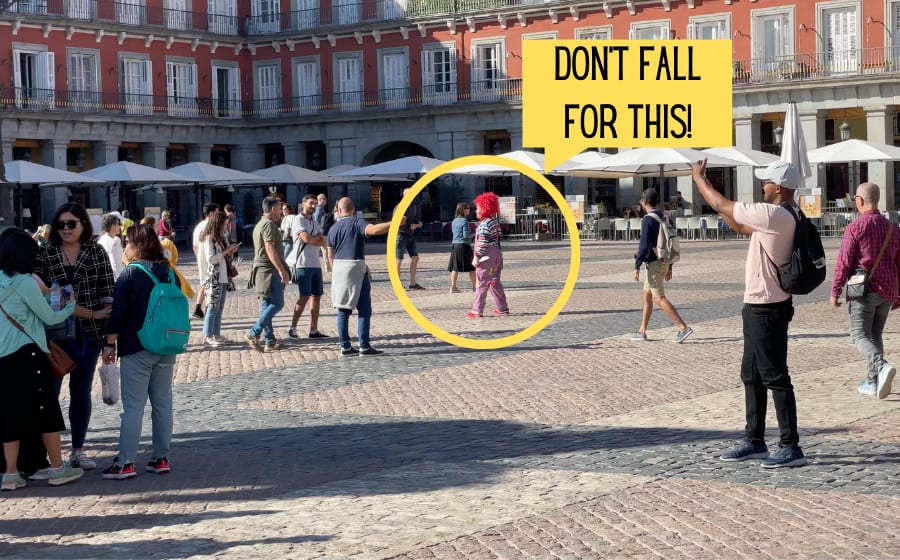12 Scams To Stay Alert in Spain: Read Before Traveling!
September 25, 2023
Win a FREE Trip to Spain!
Exciting Announcement! For the first time, we're thrilled to offer exclusive trips to the heart of Spain - an experience like no other. This isn't your typical tourist journey; it's a unique opportunity to immerse yourself in authentic Spanish culture, alongside real locals and our passionate team.
But there's more! Simply by requesting information about this amazing trip, you'll be entered into a special draw to win a Fully Paid Trip to Spain for Two. And that's not all - everyone who inquires will receive an exclusive bonus gift, valued at $500, available only now.
Ready to Discover the Real Spain?Click Here ↑ to Request Information & Enter the Draw!
Have you ever been approached by a lady offering a lucky rosemary? Or maybe he had gotten into a taxi and wondered if the driver should have taken a longer route than he should have.
These are all usual situations in a big city. “Usual” doesn’t mean they should be normal, but they happen.
In this article, I want to illustrate the scams that happen in Spain and that you might see during your trip to Spain.
I am not trying to scare you before your trip; my objective with this article is that you identify these scams when you see them and, of course, avoid them.
There are 12 scams in this list, and I have personally seen and lived most of them.
Table of Contents ▼ ▶
1. Money Exchange House
Spain uses the euro like many other European countries, so most visitors need Money Exchange Houses to get cash and be able to pay.
The fair exchange rate should be the official one; type Google “dollar to euro exchange rate,” and the result will be the one established by central banks across Europe.
Most Money Exchange House in Madrid are located in Gran Vía and Puerta del Sol, and they will not offer the exact exchange rate percentage.
In the video, you will see that we asked for several houses, and one was as expensive as 20%!!! So, before making the purchase, be sure to invite three or four establishments and make an informed decision.
Bring euros from your home country. Usually, your home bank will charge you the official exchange rate and change your dollars or home currency to euros in your best interest.
2. Taxi driver memory loss
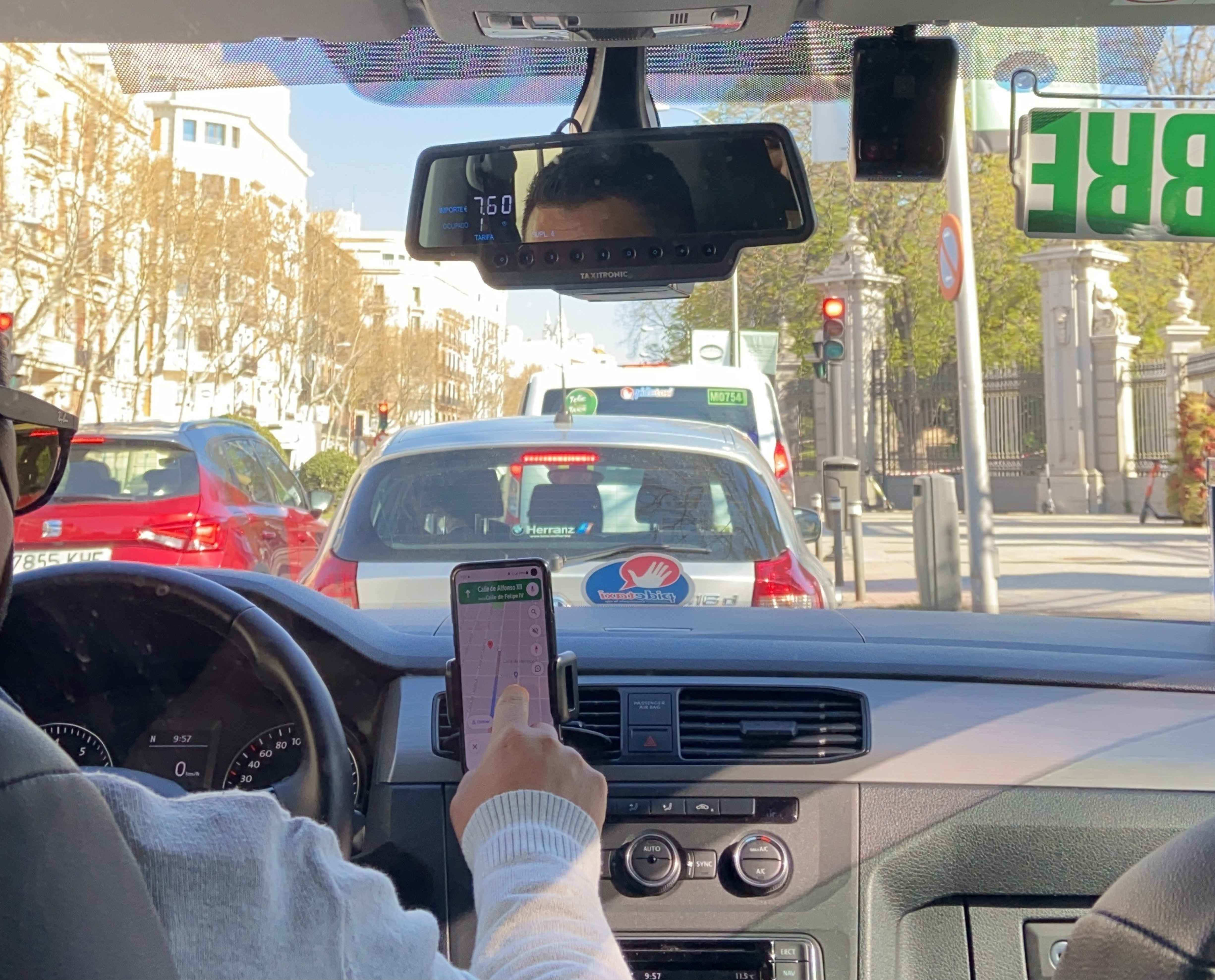
People say that taxi drivers intentionally “forget” to turn on the taximeter and will not tell you until you arrive at your destination and get a bill that makes your wallet cry.
I tried to find out if this scam was real in Madrid by getting in a taxi and asking for the drive. He was very honest and said that it could happen as an accident; sometimes, they are so focused on driving that they forget, and if it happens, he charges less.
My tip here would be to make sure the taximeter is on. In Madrid, the taximeters are located in the front part of the taxi, usually in the mirror. One simple look is enough to make sure you won’t be scammed or that the driver remembered to turn it on.
Be ready to navigate around Spain’s big cities:
3. Take a picture scam
The strategy of this scam is to make you feel uncomfortable. The video below shows how the person with the custom follows a man and insists on getting paid.
But let’s explain how it works. This scam consists of a man or woman dressed up in a costume and telling you to take a picture with them.
These people take Plaza Callao, Puerta de Sol, Opera, Palacio Real (outside), Plaza de España, and some highly transited streets near Mercado San Miguel as their work location.
They stand there and offer you to take a picture, and just like the rosemary lady, they ask you to pay after you have taken a picture.
Usually, they say the payment is “at will”, but it is best to say no straightforward.
If you take the picture and do not pay them, they will make you uncomfortable and tell you they are working hard for their family.
It can all be true, but trust me, the comments you get don’t make you feel like a good person.
4. English menu tax

How this scam works is that restaurants in highly visited places like Plaza Mayor, give English-speaking tourists a different menu with higher prices.
If you watched our video below, you would see that we discovered in Plaza Mayor this scam is a myth.
I checked all the restaurants in the famous landmark, and all of them had the same menu with the same prices. Attention here! All prices are very high for the quality you get, so it is best to avoid eating at Plaza Mayor at all.
I have not checked restaurants nearby, but be aware of this possible scam in highly visited places.
5. Where is the ball? Scam Game
This scam has a double strategy. You play the typical street name of locating the ball under the cups, which you will always lose.
The second part of the strategy is that the people doing the game get you so engaged and distracted that they try to steal your wallet from behind.
I have never seen this scam, but if you locate it in Madrid or Barcelona, just ignore it; you will never outfool this person.
6. Lucky rosemary
How does this scam work? A lady will approach, trying to give a rosemary stick. She might say things like “Guapa! Esto te traerá suerte!” (Beautiful! This will bring you luck!), and will stand her hand for you to grab it.
Sometimes, saying “No, thank you” is not enough because they might keep insisting and touching you with the rosemary stick. Whatever happens, you keep saying “no” and walk away from them.
What is the strategy behind this scam? If they offer the lucky rosemary, and you take it, they will insist on getting money.
So, before they give you the rosemary, the ladies won’t mention anything about money, but after you have taken it, they will insist on you giving them a coin or two. Watch how it happens in the video at the end of the article.
So, from this scam, we learn to say no to anyone offering us anything in the street (unless it is a cool brand that offers it for free).
7. Restaurants with no price on the menu
This scam is uncommon, but I have seen it even in high-end restaurants.
So, some places in the city center of Madrid or Barcelona might give you a menu with no price.
Imagine you arrive hungry at a restaurant; you sit down, get a menu, and ask for your dish right away. You were very hungry, so no one can blame you for not checking the menu.
When the account comes, you feel a bit surprised because the quality of your food doesn’t match the prices on that piece of paper.
What to me once isn’t exactly as I told you, but I felt scammed. So, a few years ago, I was having dinner at a mid-range restaurant in Madrid when the waiter suggested getting the day’s specials that don’t appear on the menu.
He described some delicious truffle fries, and I agreed to get them. Surprise, surprise, the fries were almost twenty euros!!! I felt very much scammed that day.
However, on our scam hunt in Madrid (see video below), we did not find a restaurant that didn’t show the price. So, just be aware!
8. Pickpockets
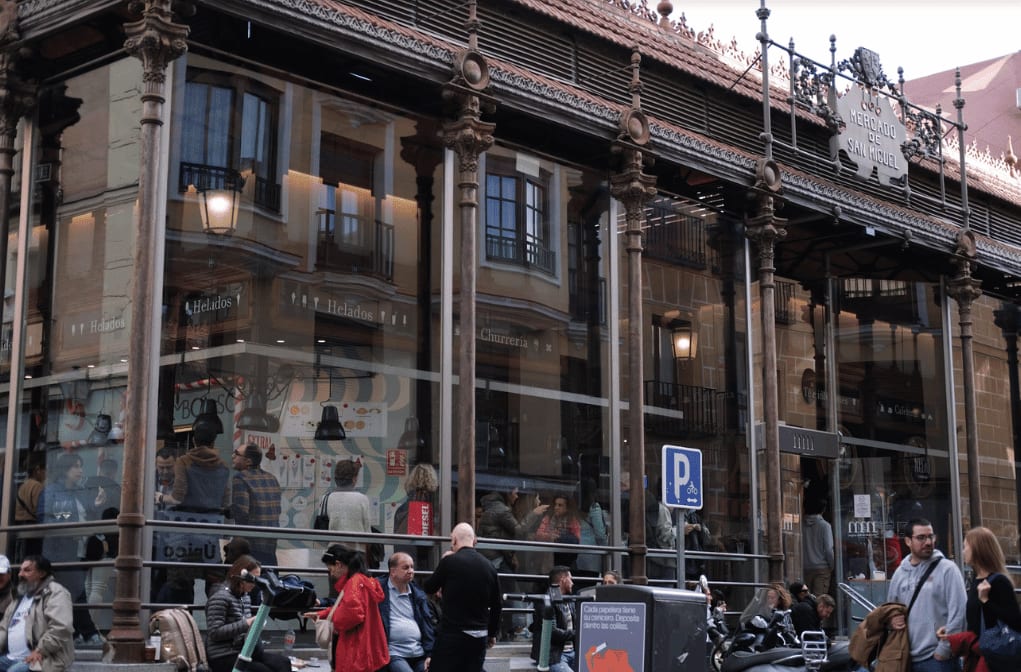
Now, this you should be aware of!! Pickpockets are everywhere in Spain, and I will tell you the best way to avoid them.
Pickpockets are silent thieves who steal your wallet, passport, or any important belongings from your bag without noticing.
The place of action is usually the metro, the bus, Gran Vía, Plaza Mayor, and Mercado San Miguel. It could be as simple as slipping your phone out of your pocket.
I once witnessed a family of four getting the wallet of one of their daughters stolen without even noticing. I was walking Gran Vía when suddenly a guy screamed: “Stop, police!”.
I thought it was a joke from a show or a YouTube channel. But it wasn’t; a guy walking from behind caught two women taking the wallet out of the bag of one of the girls in the family.
After he screamed, he said he would call the police if they didn’t return the wallet. The family was in the show. I was in shock watching everything, and eventually, the two women returned the wallet and ran.
Pickpockets take advantage of tourists who carry their bags in the back or loosely by their side while walking distracted or through big crowds.
Carry your belonging in front of you, or where your eyes can fully see them.
9. The Petition scam
In Madrid, plenty of people on the streets ask you to sign some petition in the name of a disease, foundations, dogs, etc.
My straightforward recommendation if you want to donate somewhere, or if you really want to stop and listen to someone in the street, is to take in the information, do a second research back home, and donate once you are fully informed.
So, two things can happen while you listen to these people.
They might not be a real foundation, and while you’re carefully listening, you get pickpocketed. They might not be from a real foundation, and your money gets stolen.
I was once stopped by a guy in the Corte Inglés of Princesa to donate to families with scarce resources. I heard his 10-minute speech and was open to donating some cash.
But he refused; he said I had to register my bank account in this form while we were in the MIDDLE OF THE STREET. I refused and asked for a website where I could look them up and make my donation.
He again refused and said that it was best to register my account and sign up so they could sign me up for a monthly donation (I decided the amount). I said no thank you again and tried to look at their website.
The guy got angry at me and said that the website was not standing for five hours under the sun. After that, I just walked away.
Now, I don’t know if they were real or not, but please never register your bank account in the middle of the street. You risk facing a scam.
10. Spain’s postal system scam
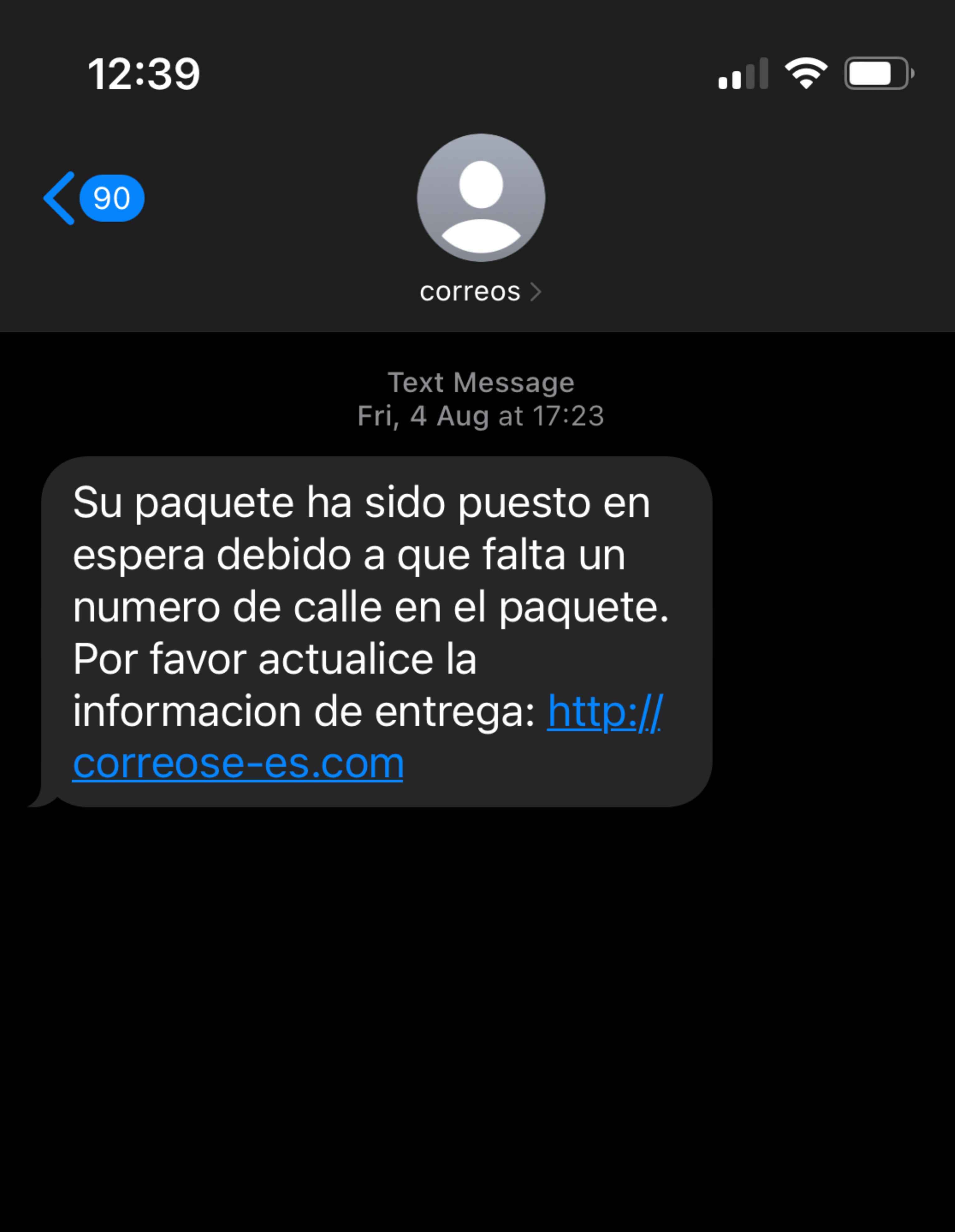
Like in the picture, you get a text message saying that your package is stuck and you must register your card.
If you are not expecting a package, don’t fall for it, and if you are, check with the real company first.
11. Spanish Tax Agency Scam
This scam has a similar concept to the one about Spain’s postal system.
You get a text message saying that some payment is pending. Again, don’t fall for it; call the Agencia Tributaria or check your profile online to see if there are any issues.
12. Bank scams
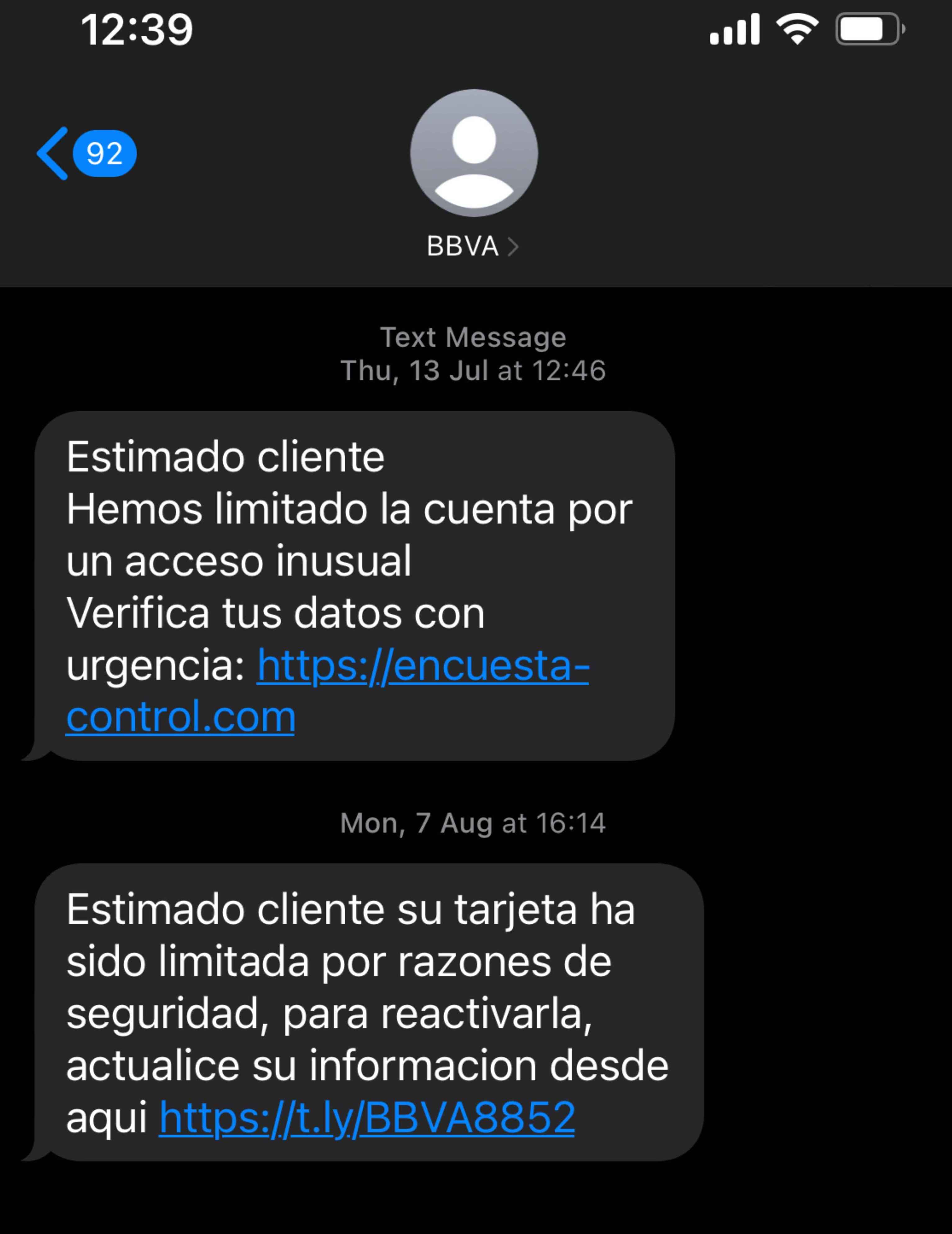
Again, in a similar concept, you will get a text message saying that your card has been blocked and that you should log in to resolve it.
Never do that; that’s just people trying to get your data.
On two occasions, I received a text message from a number pretending to be the “BBVA,” asking me to log in because my card was blocked.
As I do not have an account with them, I ignore the message, but if you do, call the bank.

Now you are aware of all the possible scams in Spain. Please read them carefully and keep them in mind for your next trip.
Spain is a safe country, but scams like the ones above can make you uncomfortable and not enjoy your time here.
If you have had any experience with something else in Spain, leave us a comment! More travelers can read you and be safe.
Happy Travels!




